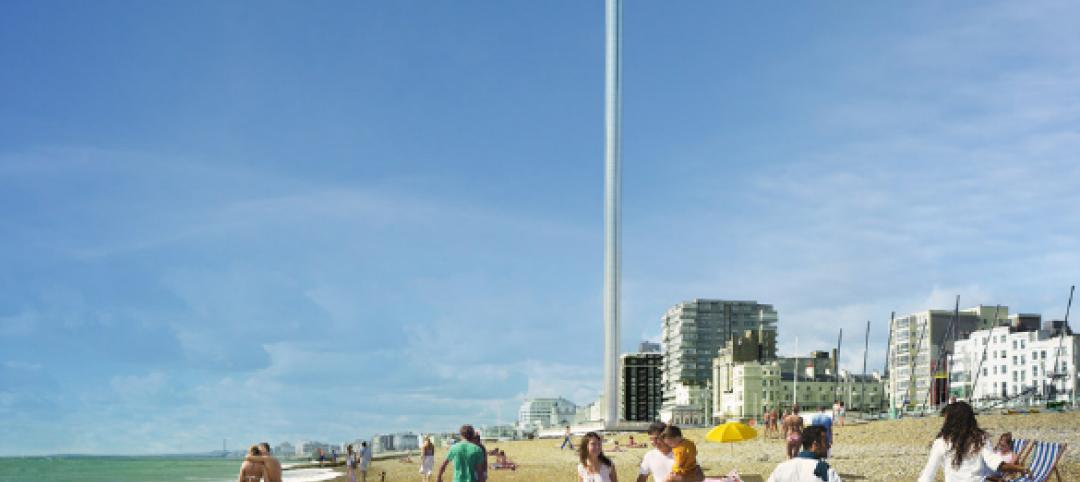
Opened in 1933, the observation deck at Rockefeller Center was designed to evoke the elegant promenades found on the period's luxury transatlantic liners—only with views of the city's skyline instead of the ocean. In 1986 this cultural landmark was closed to the public and sat unused for almost two decades. Last November, the observation deck was reopened following a $75 million renovation that restored the Art Deco masterpiece to perfection.
 |
| PHOTO: BOB ZUCKER |
Key to the deck's renovation was the creation of a full Top of the Rock “experience.” Visitors begin their tour in the building's new three-story atrium lobby, where sweeping glass stairs circle around a giant Swarovski chandelier with 14,000 crystals. Rockefeller Center's elevator room was moved and extended by the Building Team to make room for a set of new elevator cars dedicated to whisking guests to the now-combined 67th, 69th, and 70th floors.
 |
| Closed for nearly two decades, the observation deck at Rockefeller Center has been restored to its original 1933 Art Deco appearance. New features include a nine-foot-tall, basesupported safety wall fitted with nonreflective glass panels to ensure unobstructed views of Central Park and the skyline. PHOTO: BOB ZUCKER |
At the top, visitors can wander through a series of rooms and terraces leading upward to the Grand Viewing Deck, encountering exhibits and a theater focused on the history of Rockefeller Center along the way. An interactive display gives visitors the illusion of walking a structural steel beam suspended 67 stories above the street.
Out on the decks and terraces, the Building Team restored the shot-sewn limestone and cast aluminum fleur-de-lis panels. They installed new nine-foot-tall, base-supported, nonreflective peri-glass safety barriers that withstand 100-mph winds. A coil snow melt system was also added to keep the deck from becoming slushy or dangerously icy. The result: 360-degree views of the Big Apple, in a setting worthy of the name Top of the Rock.
Related Stories
| Jun 26, 2014
Plans for Britain’s newest landmark brings in international cooperation
Designers of the London Eye will team up with companies from France, the Netherlands and the United States to construct i360 Brighton, the U.K.'s newest observation tower.
| Jun 25, 2014
Frank Lloyd Wright’s Spring House, Cincinnati’s Union Terminal among 11 Most Endangered Historic Places for 2014
The National Trust for Historic Preservation released its annual list of 11 Most Endangered Historical Sites in the United States for 2014.
| Jun 23, 2014
Gehry's 'glass sail' cultural center for Foundation Louis Vuitton set to open in October
Comissioned by Bernard Arnault, American legendary architect Frank Gehry's newest structure in Paris for Foundation Louis Vuitton will house eleven galleries and an auditorium for performing arts.
| Jun 20, 2014
HOK releases proposal for Obama Library and Museum Campus
Proposal would locate the library in Chicago's historic Bronzeville neighborhood, aiming for urban revitalization as well as Living Building certification.
| Jun 20, 2014
Sterling Bay pulled on board for Chicago Old Main Post Office project
Sterling Bay Cos. and Bill Davies' International Property Developers North America partner up for a $500 million restoration of Chicago's Old Main Post Office
| Jun 19, 2014
First look: JDS Architects' roller-coaster-like design for Istanbul waterfront development
The development's wavy and groovy design promises unobstructed views of the Marmara Sea for every unit.
| Jun 18, 2014
Six World Cup stadiums have achieved LEED certification
In conjunction with the 2014 FIFA World Cup in Brazil, the U.S. Green Building Council (USGBC) announced that six World Cup stadiums have achieved LEED certification, including South America’s largest stadium, Maracanã in Rio de Janeiro.
| Jun 18, 2014
Study shows walkable urbanism has positive economic impact
Walkable communities have a higher GDP, greater wealth, and higher percentages of college grads, according to a new study by George Washington University.
| Jun 18, 2014
Arup uses 3D printing to fabricate one-of-a-kind structural steel components
The firm's research shows that 3D printing has the potential to reduce costs, cut waste, and slash the carbon footprint of the construction sector.
| Jun 16, 2014
6 U.S. cities at the forefront of innovation districts
A new Brookings Institution study records the emergence of “competitive places that are also cool spaces.”














